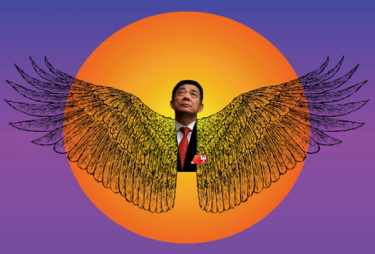
Political struggle, murder, corruption, espionage and diplomatic conflict – the downfall of Bo Xilai from the Chinese Communist Party’s (CCP) elite ranks has turned out to be a multi-faceted story. The Bo Xilai affair is also a good example of the disruptive role that social media plays in today’s China. Despite censorship, discussions on social networks caused international media to prick up their ears.
With the CCP’s once-in-a-decade leadership succession scheduled for October 2012, Bo Xilai’s case has jumped to the front page of international and local media. It has been widely argued that social media has made it unfeasible for the government to keep the story behind the scenes. However, it is also true that the government has stirred social media to its own advantage. Did the Chinese government really want to hide Bo Xilai’s story? Did social media really challenge the government control on information? The opacity of China’s politics makes it impossible to answer these questions, but they are worth a thought.
Let’s re-cap on how Chinese social media played a major role by apparently forcing disclosure and challenging government control on information.
February 2012
1. First rumors spread
Wang Lijun, Vice-Mayor of Chonqing, disappears from his post. Despite censorship, speculation regarding his whereabouts spreads on China’s micro-blogs. The rumors state that Wang has requested political asylum at the US consulate after falling out of favor with the local high-profile party secretary Bo Xilai, who aspires to a top political post. Wang may have denounced Bo’s implication in the murder of British businessman Neil Heywood.
2. A “vacation-style therapy”
An official statement on the Twitter-like Sina Weibo says Wang has been temporarily removed from his post for a “vacation-style therapy”. The phrase becomes an ironic meme on the Chinese Internet.
3. Where are the censors?
The Chinese government confirms that Wang did enter the US consulate in a post on Sina Weibo that netizens hurry to re-tweet. The censorship machine not only allows but boosts online discussions, making netizens suspicious. Blogger C. Custer, from ChinaGeeks writes:
“At the moment, Wang is back on the Sina Weibo trending topics list twice. […] Searches for “Wang Lijun” (typed correctly) remain uncensored. It’s quite clear that Sina is not trying to suppress this story at all, which begs the question: is someone at Sina trying to damage Bo Xilai?”
March 2012
4. First rumors confirmed
Official news agency Xinhua makes a double announcement: Wang has been removed from his position and Bo Xilai has been replaced as Chonqing Party Chief by Zhang Dejiang. Another report confirms that Wang did request political asylum at the US consulate.
5. Second wave of rumors flows in
In the midst of hectic public discussion on Bo’s political purge, online rumors spread about a coup d’état in Beijing and a confrontation between President Hu Jintao and Premier Wen Jiabao on one side, and Bo’s supporter Zhou Yongkang on the other.
6. Talks of coup finally wake the Great Firewall up
Micro-blogging sites Sina Weibo and Tencent Weibo block word search facilities. Days after the blocking, the government cracks down on social media. Six people are arrested and 16 websites closed for “disseminating online rumors” that “severely disturb the public order, undermine social stability and deserve punishment”, Xinhua reported. The same report states Sina Weibo and Tencent Weibo have been “criticized and punished accordingly”. The two sites halt the posting of comments for three days.
April 2012
7. Rumors become the truth
On April 10, Xinhua makes two separate announcements: Bo’s dismissal from his position at the CCP Central Committee for “serious discipline violations”, and his wife’s alleged role in the murder of British businessman Neil Heywood over “economic interests”.
Netizens can’t get over their surprise. The rumors that have been flooding the net for months suddenly make it to the covers of all official newspapers. Jing Gao, from
Ministry of Tofu writes:
“Weibo user Zhang Xingsheng wrote, “We had already followed the instruction from the higher-up that we’d never believe or spread a rumor. But today, the rumor became the truth! I am puzzled! To believe or not to believe? This is a question!”
China’s 550 million micro-blog users have witnessed a twisted public information stratagem. Online rumors becoming official truth overnight, endorsed by the same official media that censored and demonized them in the name of social harmony.
8. Political struggle and corruption
The government insists that Bo’s fall is a fight against corruption that has nothing to do with political struggle. As details on Bo’s family fortune emerge, public discussion gets heated over the enrichment of party officials. With corruption debate taking over the press, the government manages to sideline sensitive discussion on political infighting.
Again, Jing Gao reflects:
“But one thing is certain. Before the advent of social media, the government never owed the people an explanation. […] Today, with tens of millions of Chinese actively use Sina Weibo, a low murmur of political gossip may have already been amplified and heard by thousands before the internet police step in.”
Social media play a major role boosting public discussion in China by breaking systematic cover ups. However, it seems clear enough that the Chinese government has shown a remarkable expertise in playing with censorship, leaking or blocking information at its convenience to lead public opinion. Who wins? Do China’s social media outlets really challenge the government’s control of information?
For further information on the topic, please view the following publications from our partners:
Lessons from 2011: The New Media Revolution is a Strategic Asset, from the Institute for Defense Studies and Analyses.
Communist Party of China @ 90: An analysis, from the Institute of Peace and Conflict Studies.
The Arab Spring and Democratizing China, from the East Asia Institute.
For more information on issues and events that shape our world please visit the ISN’s Security Watch and Editorial Plan.

